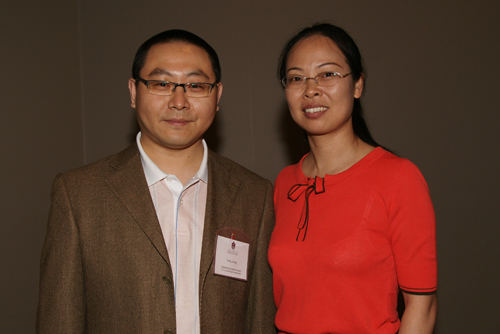Feng Jiang, a student who came from China to pursue a doctorate in science education at the University of Arkansas, has been awarded a $10,000 grant from the American Educational Research Association.
He added the honor to his recent naming as Outstanding Doctoral Student in Curriculum and Instruction for 2012.
Jiang, who will complete his doctoral program in August, will use data from international student-achievement tests to study the effect of inquiry teaching on student science literacy as part of his AERA-funded project.
"This is a huge honor for Feng and for the university," said William F. McComas, Jiang's faculty adviser. McComas is the Parks Family Professor of Science Education in the College of Education and Health Professions. "Not only are there very few such fellowships available, AERA only awards them for very promising, cutting-edge approaches to scholarship.
"What makes this project particularly interesting relates to its development," McComas continued. "The first version was a class project; then it expanded to a research presentation at our national conference and now as a developing line of investigation into inquiry teaching and in using existing databases to ask new and important questions. This is a wonderful example of how to develop a line of investigation."
Jiang explained that some controversy surrounds the topic of inquiry teaching in science education. Many in the science education community have endorsed this particular teaching strategy, and it also has been recommended by the National Science Education Standards. However, some educational psychologists have questioned the rationale behind inquiry teaching.
"Several scholars have studied inquiry teaching, but my approach is new," Jiang said. "I will be able to provide new evidence and a new perspective because I will be using an international dataset."
Inquiry teaching includes more than simply incorporating hands-on activities, Jiang said. He described it as letting students find answers from their own investigations of science-based questions. It encompasses four levels of openness, which refers to the extent of guidance provided by the teacher. Jiang outlined the levels from the lowest to the highest degree of inquiry:
Students:
- Simply take part in hands-on activities.
- Have the opportunity to draw conclusions from data they collected.
- Design investigations relative to a project suggested by the teacher.
- Choose topics to investigate; then design and carry out their own studies.
Jiang expects to find that the second level of inquiry teaching in which the students draw conclusions from the data they collected is the most effective strategy for the classroom. He will use data from two achievement tests used internationally, the Programme for International Student Assessment and Trends in International Mathematics and Science Study. In 2006, the PISA data included responses to a student survey on a wide range of questions related to science learning and teaching, Jiang said. The questions included what types of teaching strategies their teachers used in the classroom.
"Educational psychologists who researched inquiry teaching believe that it is not as effective as some other strategies because it can be frustrating to students," he said. "Inquiry usually involves more frustration, they found."
Jiang believes a good recommendation would be for teachers to occasionally use inquiry teaching methods.
"Open inquiry of science can increase interest even if the traditional gains in content are not as good," he said. McComas added that generating interest in science can be quite important as a motivational tool.
In April, Jiang presented a paper he co-authored with McComas at the annual conference of the National Association of Research in Science Teaching in Indianapolis. This preliminary study identified significant negative correlation between the use of student investigations and student achievement in science as defined by the questions asked in the PISA study.
In addition to addressing the question about the effect of inquiry teaching on student science literacy in the AERA-funded study, Jiang also plans to answer questions about the extent to which student reports of inquiry teaching activities are trustworthy and about the common implementations of inquiry teaching in U.S. science classrooms. Once he conducts his analysis, he plans to publish the results in a science education journal.
Jiang taught physics in a suburban high school in China for nine years before he and his wife, Meiyu Wang, came to the United States. He first studied at Indiana University before coming to the University of Arkansas. He shares with McComas an interest in the nature of science, a topic for which McComas is considered one of the foremost international experts. It was the subject of Jiang's master's thesis in China.
Topics
Contacts
Heidi Wells, director of communications
College of Education and Health Professions
479-575-3138,
